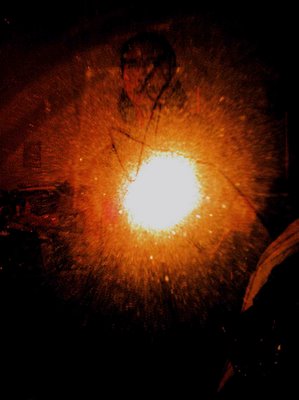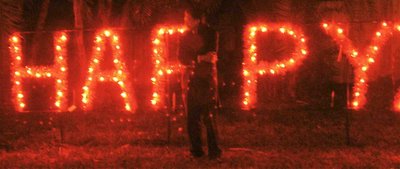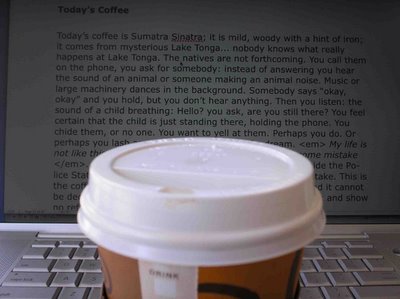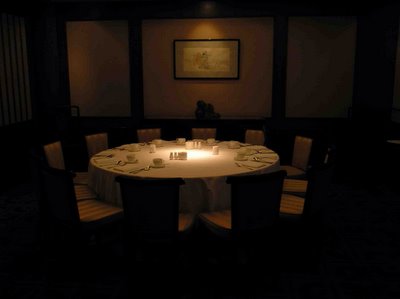
It is when abroad that we feel notre patrie best, our common customs, our roots. How cosmopolitan and indifferent to the national feeling are we in our proud cities and how requisitely contemptuous of it in our parlours and yet how quickly the fraternal feeling comes when, after so long treading alien speech we hear our familiar accents spoken by a homesick other amidst the foreign din of the underage brothel. It was moved by exactly such a sentiment that I was drawn this past Thanksgiving to the unique and esoteric table of the Master.
The Master’s estate was legendary for its beauty before he acquired it, to the point of being a familiar trope in some occasionally anthologized verse, and a tried reference in the love songs of local troubadours: its beauty was of a feminine cast, graceful and receiving. Like all the beautiful feminine things in his possession, the Master had acquired her abruptly and unclearly, visited her with ostentatious humiliation and abuse that horrified those that loved her best, violating and using her in every possible way, until finally settling down into an apathetic neglectful stupor that led many to wonder why and how the two remained together. On my approach, I could see that much of what was said was true. Every line of the place had been vandalized, beds trampled, ponds befouled, and most terrible of all, the once great sheltering trees had become an awful spectacle of horror (indeed, when upon the drive, I entreat you to keep your gaze upon the house itself and not look up - for things, most terrible things, are caught and tangled in the now dead trees, and may have not yet rotted away). Yet, familiar with the Master’s inverse sentiments and morals, in the broken windows and torn curtains of this once beautiful place, I intuited the Master’s design, his perverse sense of beauty in his maltreatment of his estate, his Roman cruelty in so parading it before the world, the affection in his uxorious loathing.
The doors to the estate remained patrician, somehow even more so with the graffitied marks of various sigils of occult intelligence, seals and inscriptions from every corner of the world, barbaric and secret scripts, some severe, many forbidden, required only by those who would the dare to know the worst of what is generally kept silent. Fresh blood and saffron highlighted the original artful carvings. The place is a dark, close, warm scented place, with smells familiar from the temple: endless incense and stale human bodies, candles, fasting, -as well as the smell of rich but rotting food, wine, sex and the low tones of something unmentionably feculent. I am shown in by some of the Master’s initiates, most of whom are short, dark, gaunt sickly girls with a drowsy opiate manner. They are wearing the most remarkable mixture of stained bed sheets and gym socks, fine lingerie and Hanes Active wear, looking less like Pre-Raphaelites than Sophomores making their worked over way back from Greek week. If the truth be told, a lot of them are prostitutes or worse, drug addicts at the least. So I am told. I only know the Master cursorily: I am as familiar as I dare, only having his acquaintance by his passing game of chess, my predilection for the demi-monde and because we belong to the same forbidden book club. I notice a bright flicker, colored as the sun, on the bare feet of my escort as she proceeds me. I look down and I realize that it is merely dust shining the pads of her feet, dust that covers the floor everywhere in a fine sheen. A metallic dust: it is gold.
Screams are heard, but nothing serious, and soon I am given the rare honor of being ushered into the presence of the Master in the dining hall on the same day as my arrival. The Master looks ostentatiously unwell, dressed only in a shapeless robe with his head badly shaved except for a thin strip. Whichever of his acolytes shorn him knew nothing of the straight razor, and in some areas it appeared that instead of precise oblique angles, the strokes had intercepted his orb and the effect had been that the Master had at places been peeled like a wormy apple. His beard, as the papers would have it, was indeed flecked with foam, but in this case, it was just the creme of a pastry horn, which he held aloft like a conch shell, while he was engaged in spitting chewed parts of it into the mouth of disciple and largely missing, while mouthing something in barbarian Greek. The Master never hurries, but it pleased him to greet me, sliding off the riotous table, which was covered with all manner of desserts and fornications: the Master had been following his gimmick of eating dessert first, “an inversion of the normal culinary order." Around the table were the usual constellation of acolytes, followers, private school occultists, camp women, initiates, bikers, failed poets and acoustic guitar aficionados, drumming circle types gone bad, exclusive college dropouts, demimondaines, liberal elitists, genuine homosexuals, fascists, transgendered necrophiles, crossword authors, occasional tribadists, ambivalent sodomites, police informers (les doulous), Planned Parenthood board members, literary theorists, anarchists, nihilists, people who talk at PTA meetings, dog groomers, gypsies, Merovignians, Rosicrucians and Rotary Club members, circus graduates, dispossessed vaudevillians, followers of Karl Popper, Darwinians, Masonic free trade enthusiasts, New Age drug dealers, quietly depraved librarians, Sufi mystics, chess masters, various branches of this or that intelligence service, model rocketry enthusiasts, gnostic plumbers, Esperanto speakers and people ruined by Magic: The Gathering. Most of them were so enfeebled by their vices and the Master’s narcotic hospitality as to be able to do little more than pick at food or sex or conversation or vomiting, which they nonetheless did in a sort of slow murmur that almost passed for oratory in the great hall.
The Master passed among his guests and initiates on his way to greet me, passing out mouthy kisses, cruel pinches and gropes, belchy gnomic stock phrases along the way, only remounting the table once to stomp on a few creme pies and kick a defecating dog. There is a deliberate lack of care in the looseness of his robe, displaying his greenish, corpulent but smooth skin, his darker third nipple and the fact that his lousy robe came from JC Penny’s. He also has a major softie, swinging back and forth like a boom, probably also deliberately cultivated for my benefit and scandal, nursed with absent minded strokes and venomous aphrodisiacs.
He greeted me with the Handshake of the Brotherhood (which I reciprocated), the Forbidden Kiss of Bahomet (which I endured) and a little something I believed he invented, possibly on the spot, that primarily resembled someone going to town on the theme of a “wet willy” (for all his Satanic trappings, the Master might be disappointed to know that visiting him is not all that different from going to a potluck with Allen Ginsburg and The Fugs). He spoke to me in voice that was sweet with opium and sour with the trickle of vomit that still dried in his beard.
“I greet you. I thank you. In friendship. In parting. Welcome to my wedding feast. Do what thou wilt! This holiday -Thanksgiving -is a wedding feast. A marriage between the Old World and New. Innocence and Experience, that is to say a rape, A malificient rape with monstrous endless issue. A numerous as bullets! Or flies! Nam, Nam Viet-Nam -the whole world is the New World now. It began, they say, as a supreme gesture of Illumination: to prove the great circle, three ships led, appropriately enough, by a fool who did not know where he was going. Yet: the point of all circumnavigation is to return. All Movement to the South, now. The South is the West. Salute the Conquistadores: Gold, Slaves, Eternal Youth! See what is possible when your lust and cruelty, greed and ambitious appetite exceed your capacity to imagine or wonder! The Marquis understood this, at the founding of the Republic: we require that all women be submitted to our pleasure. Rape, Liberation, Republicanism, these all must advance together! This is why I write letters to Hitler. Note how the turkey’s legs are positioned upwards as horns attacking heaven.”
And indeed, upon the table was a pinkish Tom, naked as a baby. The still unerect turkey timer and the uncooked blood that pooled around it indicated to me that it was probably still quite frozen on the inside. A pair of panties was luridly stuffed in its mouth and it’s legs grotesquely splayed, posed like the last Whitechapel murder. In Hebrew on the side: The World. Otherwise, the table is quite lavish, though overtaken by a riotous confusion of vices and paraphernalia, and characteristically not very nourishing, even the cranberry sauce doctored with canthinides and -worse. The dining resembled nothing so much as out-takes from Von Stroheim’s Greed.
“To express this Black Mass properly,” the Master demurred, “I would ideally sodomize a pterodactyl.”
“Later,” he reassured me, “I will become invisible. We will become invisible. All but the gods are invisible. But my opus... I have made incredible progress. Ich weiß jetzt was kein Engel weiß. I have seen mountains. Come with me to Le Chambre Des Cauchemars . For I would...”
-And here I realized that the Master had been moving with unnatural incredible slowness (like a dancer)
“...make you immortal.”
This was the Master at his most charismatic. He would talk and talk, but the bewitching thing about him would be the three fat black hairs on his head, which seemed obscenely thick and stood up straight. Or the curious motions of his flabby skin which seemed to hang and flap in somnambulant slow motion like the skin of an elephant, or his personal smell of civet and musk, mold and ambergris, sex and excretion. Some, I told myself, some of his devout, must have begun as skeptics and did nothing more than sit in on a dinner one night, a lecture, another, here and there, until one day the Master delivers some ludicrous line, like from a Hammer movie, only on one of these confused and alternately boring and thrilling nights you have seen him assume into vapor or the shape of a bat, you have come to believe and finally find that his bite and his bed are quite real. Or so I thought, regarding two sickly girls trying to seduce the same kitten.
“Come,” announced the Master.
We began our journey into the depths of the “abbey”, the Master returning to his previous theme, reciting:
Es con voz de la Biblia, o verso de Walt Whitman,
que habría que llegar hasta ti, Cazador!
Primitivo y moderno, sencillo y complicado,
con un algo de Washington y cuatro de Nemrod.
Eres los Estados Unidos!
Eres soberbio y fuerte ejemplar de tu raza;
eres culto, eres hábil; te opones a Tolstoy.
Y domando caballos, o asesinando tigres,
eres un Alejandro-Nabucodonosor.
(Eres un profesor de energía,
como dicen los locos de hoy.)
Crees que la vida es incendio,
que el progreso es erupción;
en donde pones la bala
el porvenir pones!
Which was all the more remarkable for its fludity, for the Master had no command of other languages (other than Esperanto, which he used for the Black Mass). As we walked down the cold darkened hall of this improvised abbey, I shivered and felt suddenly sober, though I had imbibed nothing. The Master’s world was narcotic, distorting, intoxicating. I knew already what lay in the chamber: pornographic and grotesque murals designed to prepare the minds of novices and titillate tipsy hitchhikers. The Master performed some of his magical opus there, which probably meant for our visit the Master rhapsodizing still further about the Babylonians (where his ideas were debatable) or the Akkadians (where he was certainly misinformed), or the Canaanites, which meant that he would invariably digress onto their sexual practices (more of an polymorphous incest fantasy in sandals). This meant probably another confused and heated sexual advance, which some has described as preferable, for all its tiresome struggle, to having him bring out his poetry. Yet here I was following him, as obedient as a dream. As we went further on, it became clear that among the many notions the Master had freed himself of, the most prominently murdered was English hygiene: the low feculent smell was unmistakably that of human feces. The road to Enlightenment: a Calcutta street.
I paused to remove some of this material from my shoe, so casually and liberally offered in the hall, tearing a page from a discarded magazine: it was floral and glossy with naked forms: I regarded it: the publication was entitled “Cheeky”. The Master loved to tear out the pages of bright, festive, fleshy pornography and litter them over schoolyards. The lurid pink scraps looked bright and cheerful against the green grass of the yard. The Master liked to think of little girls and boys excited by the discovery, of chasing after each and every piece of prurient trash, of sharing and hoarding its secrets, staining their fingers, genitals and tongues black with their frenzied explorations: for the Master had dusted each page lightly with arsenic. And he liked the articles.
What a middling, vicious Satan was this, I wondered. Was this place anything other than another a cold dark, hebephrenic shooting gallery Gehenna and the Master anything other than another aristocratic “eccentric”, in a race between the ruin of his name or his money (money finally pulling ahead), a fat ex-mountaineer with a heroin habit who discovered flagellation and his own bisexuality late in life and called it Magic? Yet this place must seem like a heaven and a hell to its inhabitants, the floors coated with shit or gold, depending on one’s perceptions. And a sangha. A place of great work. The opus.
The Master, who had glided in the darkness with effortless silence, telepathically interjected: “It is indeed an allegory. You have left the warm world of the flesh to a cold and shit filled passage. You and I are, too, are shit-filled passages. To where?” he laughed, “When we are cold and dead our nails and hair will continue to grow. Does this make us alive? Warmth will begin in the soil we carry within us. In the ass. As above. So below.” “You know what I really enjoy?” he continued, “Is Nintendo. Gambling and masturbation look like Protestant virtues in comparison. It is Enlightening because it is the picture of Godhood. Particularly Tetris.” I felt as though the Master added this latter for my benefit, as if to demonstrate that he was not entirely out of touch. He might as well have tried to talk about the Oscars.
The Master then did a very human thing: he rubbed his head. I winced in reflexive sympathy. Where, I wondered was C________ ? She certainly knew how to handle a straight razor. I cared not at all for the rest all the Master’s camp of stragglers, save her company. Her reign, seated upon the drug addled scarlet beast by the Master, I thought something of a tasteful improvement over her predecessors. She was a dark haired little thing, smart, gamine and puckish, the sort of girl who would make a puppet out of her sweater, or her panties, seated at a bistro and make it discourse, in an accurate scholarly way, on Anaxagoras or the treatment of pruritus. She was lovely and lively, but she saw things: she had probably seen them. She became high all the time because she became terrified not to be. She didn’t prosper in the Master’s company either and lastly had taken to eating mice. Which was fine for the abbey, because there were plenty of them. Yet I wondered what happened to her. I asked the Master. He replied that she had eaten a sheet of acid. Then she became Enlightened. Then she became a kitty cat. He said no more for we had reached Le Chambre Des Cauchemars.
The paintings were indeed nightmares, especially if you had a prejudice for technique: the centerpiece was a Creator God after the drawings of William Blake in a sort of goatse’d pose, creating unmentionables in an unmentionable way, with an inscription by the Comte de Lautréamont. It was appropriately crapulent. Some of the other murals were more amusing such as Deaf Lesbians Strangling a Diabetic Ferret and Aldous Huxley Sodomized by an Armored Car. Yet amidst these juvenile obscenities (where the artist seemed torn between a desire to irritate or arouse impressionable minds) were the mysteries: hidden in a copied poise or the curled fingers of a depicted masturbating Eskimo were the icons and signs that indicated that the artist had seen and understood what the murals of Minos truly depicted, the relations of the dancers and the bull, the true path of the labyrinth and the stars. It was as in the ruins of the Temple of Hermes; the most obscene joke hid the most occult truth. I was gazing upwards trying to debate whether or not to take the molecular sephiroth seriously when I skidded on a slick of something: the Master caught me in a surprisingly firm and timely grip. It was not shit this time, but blood, blood and secretion.
He righted me in an avuncular way. He looked at me in that way that parsons do and asked: Do you want to be a critic or an artist? It was for those occasional beams of acuteness that I did not take the Master entirely lightly. I realized instantly: there was no mystery here, and, -the Master wasn’t going to hit on me. As though the object lesson was complete we quit the chamber immediately.
The Master slipped into one of the private apartments along the hall, and I followed. Here there seemed to be presented another tableau, for the room appeared to be nothing other than a pinkish and frilly girl’s bedroom, only in the place of the bed there was an enormous agricultural basin or tub, filled with dark water. The meaning of this place only became clearer as the Master turned to the darling vanity table, neatly cluttered with a profusion of mirrors, boxes and bottles and proceeded to riffle through every drawer and box in an unclear pattern, with a deliberate and theatrical slowness: now this drawer, now that. I turned to a sound behind me. Ripples dimpled and ran on the mirror of the water in the basin. Another droplet fell from the teat of the damp spot in the ceiling. The basin was perhaps one droplet short of overflowing. Finally, the Master found his object and packed it in a tiny pipe. After some rather temperate puffs he announced:
“We shall go further to the center of the circle”
I exhaled. It seemed that the first drop would never breach the brim of the basin. The miniature waves seemed to hug the edge and dance around it, never spilling over, defying gravity.
“We will travel there,” said the Master “magically.”
By “magically” the Master meant “borrowing his neighbor’s truck.” His neighbor seemed the least likely person to assort with the Master, or lend him anything, and yet he assented as though it were natural.
“You will find in the coming days -a union” said the Master pulling on his gloves, but the neighbor had already receded back into the glow of the television. “The Chinese hexagram for this is “Kuh” or forty” he said to me. To the neighbor’s dog he said: “I bind you thrice” and made the appropriate signs. The dog did indeed not move: indeed, it did not wake. He made me drive.
He did not really explain where we were going and on the way we got drunk. “I never have to pay when I am invisible” the Master said amicably, only he was really drunk and really visible so I ended up paying but rather expected this. The bartender looked like he was well inured to the sight of small beers drinking themselves at his establishment. “Though I am Poore in Rags, Sneeze and Freeze/ I rejoice I am not a Pekinese” the Master laughed. He threw a decent game of darts. He was interesting enough talking about mountaineering, dogs and tea, but an absolute fright when it came to politics. It was something of relief that he became distracted and excused himself. By now I had rendered enough of my own invisible to think that the Master was not such a terrible fellow. Raised voices from the Men’s room reminded me that he was.
I should have known well enough that his priapic signs were on the the rise when he started on the young man at the bar: “You are a ghost,” he had told him “You died when you were twenty-eight. You hung yourself.” This conversation could go no where good, but I laughed to myself because Thanksgiving dinner was tasting mainly like juniper berries. The young man was fairly good looking, well-cared for, dressed conservatively, clearly had a job, a family, a place of worship and had never been to boarding school -in short, the Master hadn’t a ghost of a chance with him. Why the man felt incensed to assert his sexual preference by punching the Master was no mystery, nor why the Master did not defend himself. Only the man’s tears stood out as odd.
I still had money and influence at least as far as this bar was concerned, so I smoothed things out -in so far as they were going to be smooth -I believe I conflated the spirit of the Thanksgiving with that of Christmas, though I think my oratory was helped by the fact that sometime during the evening’s proceedings I had taken to buying rounds of drinks and wearing an autumnal wreath as a crown -which gave me a oratorical appearance -so and we beat it out of there. I felt remarkably well. In the warming cabin of the truck the Master seemed more thoughtful than drunk. “Lost soul,” said the Master. I was going to make smart reply when I noticed a number of scratches on the Master’s face and arms. “Oh no, not from tonight,” he said “Earlier, we had to sacrifice a virgin.” I waited. “But we had to settle for a cat,” he finished. “I am hungry,” he said. Remarkably, so was I. We stopped at a drive through. With the Master in his robe and I still wearing the wreath: we looked like a Satanic interpretation of an unrepentant Ebenezer and the Ghost of Christmas Past.
We entered into a bad part of town, I presumed to refill some vice that was running low or lacking back at the abbey -though I dreaded the thought of whatever unclean indulgence the Master could not acquire at home. We pulled into a local mission, crowded with the indigent receiving a free hot meal. Knowing the Master’s sometimes prodigious appetites, I guessed that we were here to perhaps cop another hot meal, for the Master was not one to pass up anything freely given. Indeed, much of his method was to make people regret such kindnesses for the presumption. This year, the shelter housed not a few families. The little ones played, or fidgeted while their parents cut their portions. The children seemed as though they had not yet grown to hate their stay here, or feel ashamed. I had a worrisome thought and immediately looked for my companion.
I found him in the serving line, though much to my astonishment, on the serving side. He seemed to have volunteered impromptu and no one seemed to mind: it seemed it was easy enough to help where help was needed. In this moment, I could not guess at his motives, so I joined him. When the priests came, I looked away, but the Master (who never passed up an opportunity to publicly insult one) was obedient and helpful, seemingly sincere in efforts. When the nuns came I thought I had guessed his purpose, but he hardly gave them a glance. He seemed remarkably industrious and even a little familiar with the mission.
I kept to my station and found the majority to be in a clear good cheer, most more lucid than the Master’s guests. The Master conversed, but in a friendly, common way with everyone. He propounded no mysteries, he did not deny the divinity of Christ. I half expected him to insinuate himself among the dispossessed and spread murmurs of discontent, evil tracts or at least the stems of a dime bag, but no. Worst of all, there was nothing pious or Christian in his attitude; he simply acted like he was at his job, his appointed task, remarkable for a man who, to my knowledge, had never held one.
We passed the rest of the evening so engaged. He indulged in one eccentricity: he introduced himself every where as “Oliver Haddo”, which I thought at the time a pragmatic consideration. I thought of the uncooked turkey back at the Master’s abbey. I knew that he believed in little of kindness and nothing of charity or altruism. He denied “good works” He believed only in the great work, his work.
It was only later that I realized the significance of all I had seen that night, the depth of his depravity and his knowledge, his pursuit of his most unquiet science, and for the first time, truly feared him, as one would fear a father.
NUMBER 39, WEEK 28; WORD COUNT TO DATE: 32,478
NEXT BY 5 JANUARY 2006









